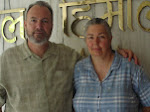WILDERNESS TRUTHS FOR MODERN TIMES-64
TEXT: "Then Jesus beholding him loved him, and said unto him, One thing thou lackest: go thy way, sell whatsoever thou hast, and give to the poor, and thou shalt have treasure in heaven: and come, take up the cross, and follow me." (Mark 10:21)
I. FOR BETTER OR FOR WORSE
A. Because the Wilderness of Zin is a critical point it can be a turning point for better or worse. Thus it can be a point of a new beginning. This is a place from which God calls the children of Israel to go up and to possess the land.
B. But the choice of these people is going to determine whether they have a new beginning and a better life or deal-end course and a worse life. And so the choice itself becomes critical
C. Jesus says to the rich young ruler, "sell all that you have and fellow me." The rich young ruler is forced to make a decision. Will he or won't he follow? One way or the other he will make a decision which will set his course for life, and then some. Just that one decision will carry unimaginable implications. "Come," Rich Young Ruler, "take Judas' throne."
D. Judas, called by Jesus to be one of the twelve chosen disciples, desired money, and so made material gain his objective in life. He made the greatest decision of his life, which cost him his life and his possibility his eternal position.
E. Was it the riches, the money that caused them to turn away of the Lord? Or was it the love of earthly riches instead of the heavenly riches?
"For the love of money is the root of all evil: which while some coveted after, they have erred from the faith, and pierced themselves through with many sorrows." (I Timothy 6:10)
F. What was it that the Lord was during in them to force them into making a choice? Was it the Lord not wanting to have money? No. Did the Lord hate Judas and the Rich Young Ruler? Of course not. It was their choice not to serve Lord. Jesus gave them both the same invitation, "follow me." They both made the wrong choice.
G. Saul of Tarus, on the road to Damascus, met this same person who crossed the lives of the Rich Young Ruler and Judas.
"And he trembling and astonished said, Lord, what wilt thou have me to do? And the Lord said unto him, Arise, and go into the city, and it shall be told thee what thou must do." (Acts 9:6)
That choice resulted in monumental implications not only in the life of Saul himself (later to known as the great apostle Paul), but in the whole Church of Christ. That was just one decision.
H. God doesn't say to us, "Now watch out, this is your critical." How often is the right decision missed? We are to be ready at all times to give the Lord the answer, the response, the decision which He seeks. ALWAYS give God what He wants. That way we will not have to be concerned about when the critical may occur.
I. Our safety in this matter is to lay aside our own will and do the will of our heavenly Father. Ananias and Sapphira made their most critical decision when they decided to lie to the Holy Spirit and to God. (Acts 5:1-10)
J. The Wilderness of Zin, and especially the specific place of the encampment of the children of Israel, Kadesh, are very critical. "Kadesh" means "to consecrate," "to cleanse," "holy." These meanings play an important role in our choices. A life which is consecrated to God, a heart which is daily cleansed from sin, a walk of holiness, and pureness before God, the desire to obey God at all costs, become the element in our lives which will take us in God's direction and to His conclusions.
K. It was in Kadesh that Moses smote the rock instead of speaking to it. (Numbers 20:9-13) Kadesh, this place of holiness, was to be for Israel the place of final separation from the flesh.
L. The finality of it is seen in "and Miriam died there, and was buried there." Who is Miriam? She is the one who carried leprosy with her through the Red Sea. That is, she carried her faultfinding and murmuring within herself only to be manifested later. There is to be death to all this; sin shall not rule. Sin and flesh are not to have the victory. Paul tells us in Romans 6:14, "sin shall not have dominion over us."
II. PARTING THOUGHTS
A. A life in God must be maintained through daily rededication. God brought Moses and the people to a place of rededication, or renewed separation and concretion and cleansing. This was done at Kadesh.
B. On the basis of this renewal they would go up to possess the Promised Land. If they failed in the time of renewal they would fail in their choice and they would fail in their forward spiritual progression, and they would fail to go up and possess the land, failing to inherit that which God called them to inherit.
C. If there is to be any degree of success in God, there must be a constant renewing of our separation and consecration, our separation from the flesh and our consecration unto God. Just as the mercies of God are new every morning, so must our spirit, strength, inner man and mind be constantly renewed. (See II Chronicles 15:8; Psalm 51:10; Isaiah 40:31; Romans 12:2; II Corinthians 4:16; Ephesians 4:23)


No comments:
Post a Comment